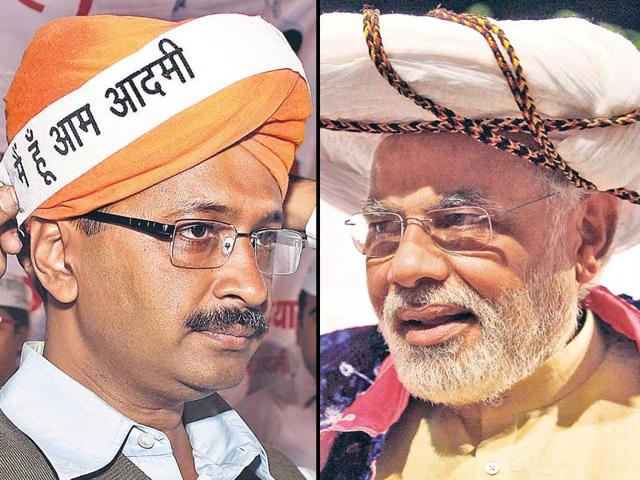Varanasi shouldn't oblige political use of its legacy
If Narendra Modi’s bull-horns do get locked in Varanasi with Arvind Kejriwal’s sharp ram-antlers, we will witness a riveting contest.Varanasi’s hospitality to the two outsiders will be following a notable tradition, writes Gopalkrishna Gandhi.
If the Gujarat chief minister’s bull-horns do get locked in Varanasi with Arvind Kejriwal’s sharp ram-antlers, we will witness a riveting contest.

Varanasi’s hospitality to the two outsiders will be following a notable tradition.
Vengalil Krishnan Krishna Menon and Acharya JB Kripalani fought each other in North Bombay in 1961. Neither of them was Maharashtrian. Lal Krishna Advani, with no Gujarat connections, stood in 1999 from Gandhinagar. He was ‘taken on’ by a fellow-citizen whose links with that city were no less tenuous — Tirunellai Narayana Iyer Seshan. That very year, Sonia Gandhi and Sushma Swaraj contested the Bellary seat. Neither was Kannadiga.
All these ‘outsider vs outsider’ contests raised the profiles of those elections to a rare national salience. Much more than local or regional issues came to be debated in those, much more than a seat was won or lost.
Likewise, Varanasi in 2014 is going to be about much more than a particular seat.
It is going to be about the future of India.
And, very appropriately, Varanasi has it in its chemistry, to give spell to that future as few other places can.
The person opposing Narendra Modi in Varanasi, whoever he or she is, will need to be an outsider if he or she is to raise that contest to the level of a national contestation. And for that to happen, he or she has to be backed by all secular forces, the Indian National Congress in particular.
What should Modi’s opponent, whoever he or she is, say to the Varanasi voter?
Perhaps something like this:
“I am an ‘outsider’ here, as you know.
I am not a fellow-Benarasi.
The chief minister of Gujarat is also an outsider here, not a fellow-Benarasi.
The sole reason why I have come to seek your vote is this: If one outsider claims your vote, another should also be given the same chance. We are both perhaps, equally undeserving of your trust.
Now, I have told you why I have come here.
But let me ask Modiji: Why, good sir, have you come here?
For love of Varanasi?
Surely not, for you could have shown that love many times, many times earlier than now!
Let us be honest. You have done so because Varanasi is supposed to be a safe seat for the BJP. ‘Safety first’ is the motto for airlines and railways. But with you, it has become a personal motto as well. The proclaimed future prime minister of India does not want to enter his dream office through any turbulence, through any uncertainty, strain or risk. You want to enter it safely, smoothly, comfortably. You want to be red-carpeted into it.
Varanasi’s vote has to be earned, sir!
There is another, more important reason for your wanting to contest from Varanasi, is there not?
Varanasi is no ordinary city.
It is a city the world knows and respects as a Holy of Holies.
Through it flows a river the waters of which anoint with their holiness.
Let the Ganga cleanse what wants to be cleansed, not anoint what wants to look anointed.
Varanasi should not oblige a political packaging of its heritage, a political using of its legacy.
This city is Hindu, it is Muslim, it is Buddhist. It can even belong to men and women of no religious faith.
I value Varanasi for I can pray here to Sri Vishwanath, and also go to Sarnath to offer my obeisance to the greatest Indian that ever lived, Gautama, the Buddha.
I value Varanasi because this is where Ustad Khan Bismillah Khan sahib lived and played his immortal shehnai.
It is to that Varanasi, which belongs to all of India and to which all India belongs, that I come seeking its vote. I do not seek the votes of a section of Varanasi, a polarised, inflamed, section of Varanasi, but of all its people, because Varanasi is all its people and all its residents are Varanasi.
Do not let anyone divide Varanasi, do not let anyone cut it up so as to run away with its biggest chunk.
Do not let anyone manipulate, mutilate Varanasi.
Do not let anyone manipulate, mutilate Bharat.
We are much more than a nation. We are a civilisation in which people of a variety greater than in any other country live.
We are also a nation in which the world’s poorest and the exploited live.
Our national emblem is drawn from Asoka’s lion capital at Sarnath, Varanasi.
The four lions on it stand back to back, symbolising power, courage, pride, and confidence. Three lions are visible, one is hidden. I would like to believe that the one hidden is the one standing for confidence.
This election must give us that which we have looked for, longed for — confidence, vishvas.
The confidence of the poorest, the most vulnerable, not in this or that leader but in democracy as a just system.
Our national motto ‘Satyameva Jayate’ has to be the most beautiful in the world.
But we should remember that just as the fourth lion is invisible in the emblem, the motto has a half-line that has been, for brevity’s sake, edited out. It is ‘Naanritam’, meaning ‘Not Untruth’. The full quote from the Mundaka Upanishad is ‘Satyameva jayate Naanritam’. Truth alone triumphs, not untruth.
May Varanasi live up to the national emblem and motto that it has given to India.”
Gopalkrishna Gandhi is a former administrator, diplomat and governor
The views expressed by the author are personal





